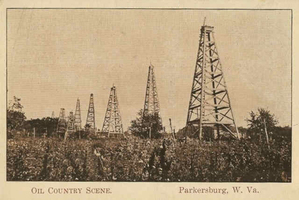 | Back to e-WV
| Back to e-WV
 The West Virginia Encyclopedia
The West Virginia Encyclopedia
 | Back to e-WV
| Back to e-WV
 The West Virginia Encyclopedia
The West Virginia Encyclopedia

The oil and gas industry in West Virginia originated at Burning Springs, located in Wirt County on the Little Kanawha River upstream from Elizabeth. The community’s name was derived from two springs from which natural gas escaped and sometimes burned. William Palmer Rathbone began purchasing land here in 1840, eventually gaining more than 10,000 acres. The following year he arrived in Burning Springs with his sons. The Rathbones collected oil from the surface of the river and sold it as an elixir known as ‘‘rock oil.’’ They also began drilling for salt brine, but found the brine contaminated by oil.
After the first oil-producing well was drilled in Pennsylvania in 1859, Samuel D. Karnes leased the brine well from Cass Rathbone and began pumping seven barrels of oil from the ground daily. The Rathbones followed suit, drilling just below the mouth of Burning Springs Run. In July 1860, they struck oil and began producing 100 barrels a day. Their next two wells each produced more than 600 barrels daily. The discovery drew thousands of people to Burning Springs, turning it into ‘‘a Sodom of sin, anointed with oil.’’ Lighting in the town was provided by the abundant natural gas from the wells. The oil was shipped to a refinery in Parkersburg constructed by Johnson Camden.
The Burning Springs field was one of two producing oil fields in the world at the outset of the Civil War. In May 1863, Confederate Gen. William E. Jones raided Burning Springs and set fire to the oil field. In reporting the spectacular results to Gen. Robert E. Lee, Jones perhaps overestimated the amount of oil burned at 150,000 barrels while noting that it turned the Little Kanawha River into a ‘‘sheet of fire.’’ Production resumed a year later, and after the war hundreds of wells were drilled in the area. The oil industry declined rapidly in the Burning Springs area in the latter part of the 19th century. A park was opened at Burning Springs in 2004. Oil is occasionally pumped from the Rathbone well for souvenirs.
Burning Springs was added to the National Register of Historic Places in 1971.
Read the National Register nomination.
Written by Joe Geiger
Comstock, Jim, ed. West Virginia Heritage Encyclopedia vol. 4. Richwood: Jim Comstock, 1976.
Lee, Howard B. The Burning Springs and Other Tales of the Little Kanawha. Morgantown: West Virginia University, 1968.
Reed, Louis. Conflict and Error in the History of Oil. West Virginia History, (October 1963).